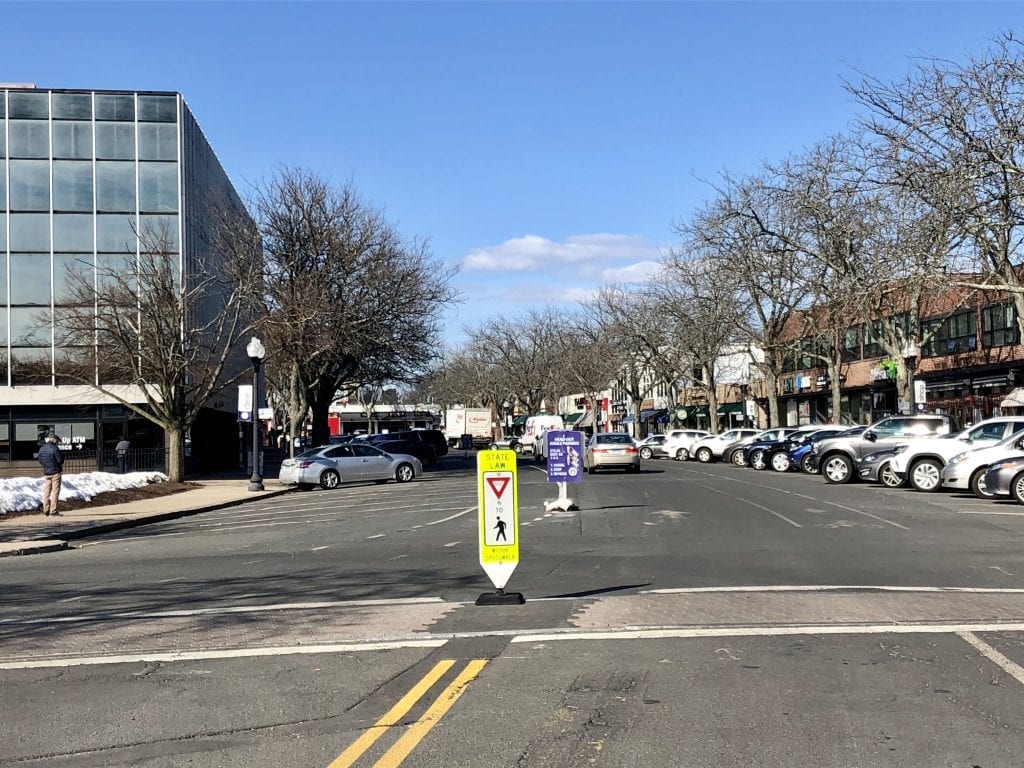Crosswalks, Cannabis and New Nip Fee Among Laws In Effect Friday

Audio By Carbonatix

Nips at Connecticut Beverage Mart. CTNewsJunkie.com file photo
A variety of new laws take effect Oct. 1, 2021 in Connecticut.
By Hugh McQuaid, CTNewsJunkie.com
New laws taking effect in Connecticut Friday will give pedestrians safer options in crosswalks, medical marijuana patients the right to grow cannabis plants in their homes, and alcohol consumers a new fee on nips.
Those are a few of the changes Oct. 1 will bring as a handful of bills or provisions of new laws go into effect on Friday. Among the new statutes are elements of sweeping legislation designed to protect pedestrians and cyclists on Connecticut roads.
Crosswalks
One element of that bill taking effect will change how pedestrians interact with motorists when trying to cross a street. The change removes a requirement for pedestrians to step into the road to signal their intent to use a crosswalk and requires motorists to yield. Under the new law, they can wave from the side of the road.
The pedestrian safety law also gives municipalities greater flexibility to set their own speed limits without seeking approval from the state and prohibits “dooring,” a practice in which someone opens a vehicle door into cyclists and pedestrians or leaves the door open in order to block their path.

Pedestrians no longer have to step into the road to signal their intent to cross, but can now wave to a driver from the side of the road to indicate their intent. Photo credit: Ronni Newton (we-ha.com file photo)
Cannabis and Smoking
Medical marijuana patients at least 18 years old can begin growing cannabis plants beginning Friday under a provision of a new law which legalized recreational cannabis this year. The rules allow for patients to grow up to six plants (three mature and three immature) in their homes. Although the bill will eventually allow any consumer to grow cannabis plants, lawmakers delayed that provision until July 1, 2023.
Stricter rules on where smokers of cannabis or tobacco may light up will also go into effect. The law expanded areas where smoking cannabis, cigarettes, or vaping is prohibited, meaning that people who vape or smoke tobacco based products will be barred from smoking 25 feet outside a restaurant or public building.

Cannabis buds. CTNewsJunkie file photo
Nip Fees
Elements of an update to Connecticut’s bottle redemption law kick in on Friday. Among them, a new 5-cent surcharge on small 50mL liquor bottles known as nips. Money collected through the fee will be given back to the municipalities in which the bottles were sold and towns will be expected to use the revenue for environmental purposes.
In order to discourage littering, some lawmakers had sought to attach a bottle deposit to the tiny bottles, which are often found discarded alongside roadways. However, representatives of state liquor sellers said redemption of the nips would be onerous for store owners and successfully pitched the surcharge as an alternative. So there is still no place to return the nips and get your money back.

Nip bottles. Photo credit: Ronni Newton (we-ha.com file photo)
Domestic Violence
Other changes in Connecticut policy relate to a bill which broadened the definition of domestic violence to include coercive control, a term for behaviors such as threats, intimidation and withholding resources that would allow a person to live independently or leave the relationship. The law enables victims of coercive control to seek protective orders.
Although much the bill went into effect over the summer, new elements allow domestic violence victims with protective orders to have their landlords change their dwelling’s locks, allows courts to independently issue standing protective orders on behalf of victims, and lets courts consider whether an arrested person represents a heightened risk of family violence when weighing that person’s release.
The bill was called “Jennifer’s Law” by proponents in honor of Jennifer Dulos, a missing New Canaan mother who was believed to have been killed by her estranged husband, as well as Jennifer Magnano, a mother who was killed by her husband at her home in Terryville.
Job Applications
New laws will also adjust state policies on the process of applying for a job. Beginning Friday, employers are required to disclose to applicants a “wage range” for the position sought. The range could include a pay scale, a budgeted salary, or the pay of current employees in the position. The policy is designed to reduce gender wage discrimination.
Another law seeks to prevent age discrimination by barring employers from requiring certain biographical information from job applicants. With some exceptions, employers can no longer request an applicant’s age, or the dates they attended school or graduated.
Broken Traffic Lights
Beginning Friday, a new law will require motorists approaching an intersection where the traffic light is not functioning to treat the intersection as if a stop sign were present unless otherwise directed by police.
When the House passed the bill in May, Rep. Roland Lemar, a New Haven Democrat who co-chairs the Transportation Committee, told colleagues to file the policy under “I thought that was a law already.”
“Now, we might approach during a storm, a hurricane, a power outage, an intersection where the lights aren’t working, and we may think, ‘Well, I learned about this in driver’s ed, so many years ago. I’m supposed to treat this like a four way stop sign, and follow those traditional rules,’” Lemar said. “But it turns out, Mr. Speaker, that that actually isn’t a law.”
As of Friday, it will be.
Republished with permission from CTNewsJunkie.com, all rights reserved.
Like what you see here? Click here to subscribe to We-Ha’s newsletter so you’ll always be in the know about what’s happening in West Hartford! Click the blue button below to become a supporter of We-Ha.com and our efforts to continue producing quality journalism.



